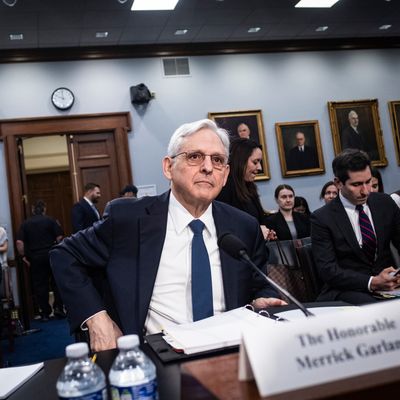

Photo: Pete Marovich/The New York Times/Redux
The ascent of Vice-President Kamala Harris as the Democratic Party’s new leader has changed everything for everyone in (or aspiring to) every position of power. For Attorney General Merrick Garland, it means the certain end of his tenure as the nation’s top law-enforcement official earlier than he might’ve hoped. When he leaves office in the coming months, Garland will depart with his most important work unfinished — perhaps permanently.
It’s always been the case, of course, that a Donald Trump win in 2024 would spell the end of Garland’s tenure as AG along with that of every other Biden Cabinet member. That’s how things work in Washington, D.C.
But if Biden had remained in the race and then won the election, Garland would’ve had at least a chance to stick around for a few more years. Garland had given no public indication that he intended to wrap things up if Biden won, and he said in an October 2023 interview, “I have a good working relationship with the president.”
Of course, the decision would’ve been Biden’s, not Garland’s, and recent history gives us a mixed record on presidents keeping AGs around for a second term. Bill Clinton retained Janet Reno as AG for his entire two-term, eight-year run – but it would’ve been politically perilous for Clinton to relieve the fiercely independent Reno, who had initiated an independent counsel investigation of the president during his first term, in 1994. George W. Bush switched from John Ashcroft to Alberto Gonzales as AG at the start of his second term in 2005. Barack Obama kept Eric Holder on board into the second term, until Holder moved on in 2015. Donald Trump only served one term, and he canned his oft-humiliated AG, Jeff Sessions – whom Trump had publicly called “scared stiff and Missing in Action,” “beleaguered,” and “confused,” – by humiliating Tweet, literally minutes after the 2018 midterms. Good times.
I had my doubts that Biden would’ve kept Garland as AG in a second term, and I’m hardly some revolutionary thinker for that. A few months ago, I asked a friend who worked in the Biden White House whether Biden would keep Garland; this person laughed out loud and exclaimed, “That’s a no.” Indeed, Politico reported in early 2024 that Special Counsel Robert Hur’s report on the Biden classified documents case “infuriated the White House” and that Biden’s “frustration” with Garland was growing.
Still, it could’ve been dicey for a second-term Biden to dispatch the same AG who had appointed a Special Counsel to prosecute the cases against Biden’s own son. both of which will be ongoing when the new administration takes over in January 2025. (Hunter Biden will be sentenced before then on his Delaware gun case, but his appeals will continue into next year. And the California tax fraud trial is set for September 2024, so either sentencing or appeal will remain pending into 2025. Of course, a pardon by the outgoing president would end all of this.)
All in all, though, it wasn’t looking great for Garland, even if Biden had stayed at the top of the ticket and won the election. He might’ve still held a Jim Carrey “So you’re telling me there’s a chance” kind of chance. But with Harris now the Democratic nominee, it’s over. She’d have zero political or personal reason to keep Garland on board, and to forfeit the chance to install her own chosen attorney general.
So it’s time to start considering Garland’s legacy. First, for what it’s worth, I like and respect Merrick Garland. I’ve met him, and know many people who have worked closely with him; he’s genuinely pleasant and personable, and he exudes no airs despite his remarkable career as a federal prosecutor, federal appellate judge, and, now, as the AG in charge of over 100,000 people.

Listen to The Counsel podcast
Subscribe on:
Consistent with his humble personality, Garland has been a safe and boring attorney general – and I mean that as a compliment. The man has been honest with the American public (unlike his recent predecessor, Bill Barr) and he’s done much to restore DOJ’s institutional credibility. Garland is a walking, talking version of the Justice Manual, DOJ’s internal guidance to prosecutors, full of bland but important statements about the highest prosecutorial principles: we follow the facts and law, we operate without fear or favor, we are above and beyond politics, and the rest. He recently held a hard line to protect DOJ’s institutional independence, refusing to open up criminal investigative files to Congress and righteously taking a contempt citation in the process. And Garland’s term has featured substantial investigative and operational successes.
But the cold reality is, and has been since the moment of his nomination as AG, that whatever Garland did in the job, all anyone would remember were the Trump cases. It’s unfair, but it’s inevitable. The history books and the American public don’t focus on the minnows and the pike when there’s a white whale swimming around.
The debate about whether Garland took too long to charge the Trump cases – or to appoint a Special Counsel to get the job done – is over. Exhibit A: there’s not going to be a federal trial before the 2024 election. End of story. Indeed, I wrote in mid-2022 that Garland had nearly run out of time, and in my book in late 2022 that he had fully run out of time; DOJ took another half-year-plus from then to get the cases charged. A stubborn few have continued to insist Garland hadn’t taken too long or wasn’t to blame for the delay. Well, here we are.
And the outlook isn’t brilliant for DOJ, on the whole. The classified documents case is, technically, dead following a dismissal by Judge Aileen Cannon. I expect the appeals courts will eventually reverse her and reinstate the charges. But the timeline is now blown to hell, the case faces all manner of legal challenges and a brutal judge even if it survives, and it dies altogether if Trump wins. And the 2020 election subversion case has been torn to shreds by the Supreme Court’s immunity ruling. If the case survives at all, we’re realistically looking at trial on a fraction of the original charges, perhaps in late 2025 or 2026.
Some of Garland’s legacy will turn on what happens over the next few months, and then after he leaves office. If Trump wins the election, forget it; he’ll never face federal trial, and Garland’s inexcusable delay will be squarely to blame. If Trump loses the election, then maybe one or both cases eventually reaches trial and results in conviction. If so, Garland’s defenders can cast him as the prosecutorial tortoise, slow and steady but ultimately victorious.
But that outcome depends on an awful lot of contingencies that Garland has left entirely beyond his own control. He’s like a starting pitcher in baseball who gets pulled from the game with the score tied, the bases loaded, and nobody out. His teammates, and the breaks of the game, might ultimately bail him out. But he’s left them on the brink of defeat, with essentially no margin for error or misfortune.
Not every public servant needs to be regarded as hero or villain, dragon-slayer or coward. It seems increasingly likely that, fairly or not, Garland will be regarded as a failure, based almost entirely on the Trump cases. In the fuller sense, though, he’s done a fine job on the institutional level, and he’ll never get due credit for his non-Trump cases and initiatives. But that’s the deal when you take on a public office with massive power and responsibility: we only remember the Big One. Garland is a decent man, and he’s been a decent AG. But his fate seems clear now: he will leave office, soon, and his most important job will remain undone.
This article also appeared in the free CAFE Brief newsletter. You can find more analysis of law and politics from Elie Honig, Preet Bharara, Joyce Vance, and other CAFE contributors at CAFE.com




